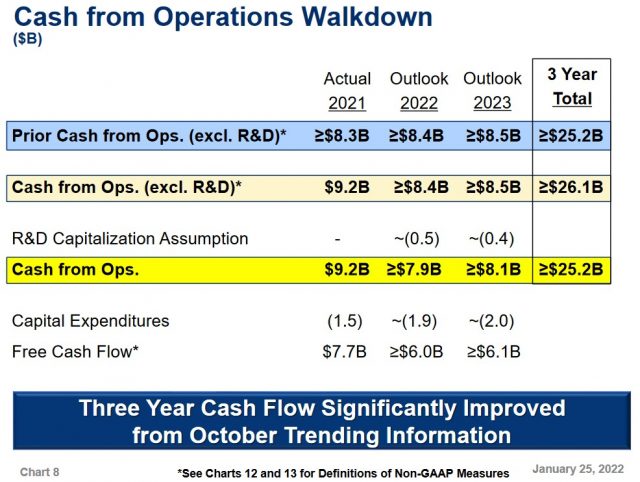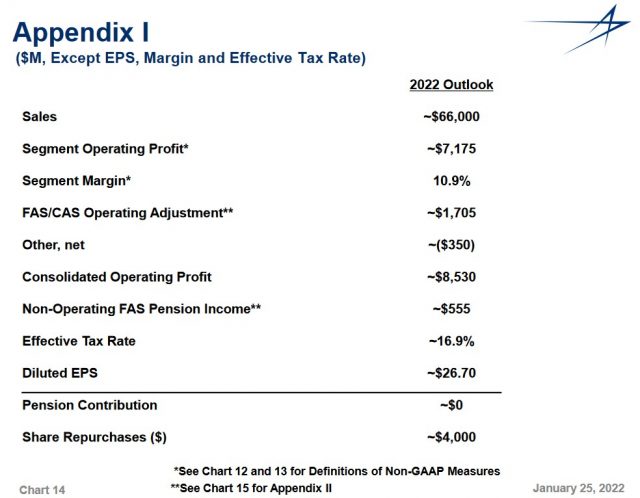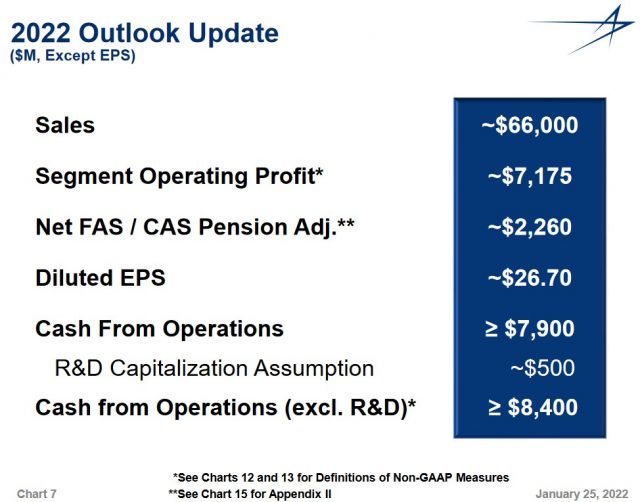Contents

I last reviewed Lockheed Martin (LMT) in this October 27, 2021 post. At the time, LMT had just released Q3 and YTD2021 results and FY2021 guidance.
LMT shocked the investment community on August 3, 2021, when it disclosed:
- that its Chief Financial Officer (CFO) decided to retire immediately due to personal reasons; and
- FY2021 adjusted diluted EPS guidance had been lowered from $26.70 - $27.00 to $21.95 - $22.25.
Following these announcements, LMT's share price trended lower until it reached ~$336 on September 21. The share price subsequently rebounded to ~$377 but upon the release of Q3 and YTD2021 results, the share price plunged to ~$332.
Despite this terrible news, my long-term outlook for LMT remained unchanged. I viewed the ~$44 drop in the share price on October 26, 2021 as a wonderful opportunity to acquire additional shares in this high-quality company; I acquired additional shares in one of the 'Core' accounts in the FFJ Portfolio.
LMT's share price has subsequently risen to ~$380 as I compose this post. With the release of Q4 and FY2021 results and FY2022 guidance, let's see if LMT is reasonably valued.
Recent Events
Aerojet Rocketdyne Acquisition
On December 20, 2020, LMT announced it had entered into a definitive agreement to acquire Aerojet Rocketdyne Holdings, Inc. (AJRD) for $4.4B including the assumption of net cash.
Although the Federal Trade Commission (FTC) expressed its reservation about the acquisition, LMT argued the merger should follow the same template as Northrop Grumman’s (NOC) 2018 acquisition of solid rocket motors manufacturer Orbital ATK; that deal was approved by regulators on the condition NOC agree to supply motors to its competitors.
On January 25, 2022, the FTC voted to sue to block LMT's proposed purchase of rocket engine maker AJRD because it would give LMT too much power over the U.S. missile industry; this decision was not unexpected.
FTC has advised Aerojet and LMT that the transaction cannot be addressed adequately by the terms of the proposed consent order. Under the proposed consent order, LMT would agree to make Aerojet’s rocket motors available to competitors on a non-discriminatory basis and firewall AJRD’s engine business from LMT's missile manufacturing operations. This arrangement, however, has not been satisfied.
This acquisition has also been criticized by Raytheon Technologies (RTX), LMT's main competitor in the missile market. AJRD’s engines are used by both RTX and LMT in tactical and strategic missiles the companies make for the U.S. Defense Department.
Were the FTC to approve the consolidation of Aerojet under LMT, RTX would be placed in a position of having to purchase ~70% of its missiles propulsion systems from its primary competitor.
LMT is now in a position in which it must choose to defend the lawsuit or terminate the merger agreement.
NOTE: In anticipation of LMT's acquisition of AJRD, AJRD's Board approved the distribution of a $5 'special dividend' on March 24, 2021; AJRD had never distributed a dividend. Now that the acquisition is highly unlikely to proceed, AJDR has no way of recovering the $428.5 million it distributed to shareholders.
Financials
Q4 and FY2021 Results
LMT's Q4 and FY2021 results and FY2022 guidance are reflected in the January 25 Form 8-K and Earnings Presentation; these documents include results by segment and details of cash deployment activities.
LMT's FY2021 Net Earnings fall short of those reported in FY2021 primarily because of the $1.235B Non-service FAS pension expense.
In my previous post, I indicated the supply chain disruptions experienced in Q3 underscore the fact many of LMT's suppliers are still dealing with the financial stress caused by the global COVID-19 pandemic; LMT's suppliers continued to experience this strain in Q4 and this strain is ongoing.
LMT's ability to generate strong cash from operations enabled it to accelerate $2.2B of payments to suppliers during Q4 2021 for payments due in Q1 2022. In Q4 2020, it accelerated $2.1B of payments to suppliers in Q4 2020 that were due in Q1 2021.
LMT has maintained accelerated payments since the onset of COVID and expects to continue to make such accelerated payments through FYE2022.
Outlook
Management's FY2022 outlook is as reflected below.

Source: LMT - Q4 and FY2021 Earnings Presentation - January 25, 2022
Pension Trends
In my October 27 post, I touched upon LMT's pension liabilities; LMT included information on this topic in its Q3 Earnings Presentation (refer pages 17 - 20).
Interest rates have increased since FYE2020 and YTD2021 actual returns have been higher than previously expected. The trends include no required pension contributions through 2025 based on current assumptions. A $0 contribution is reflected in LMT's FY2022 Outlook.

Source: LMT - Q4 and FY2021 Earnings Presentation - January 25, 2022
Credit Ratings
LMT's senior unsecured domestic currency debt ratings are unchanged from the time of my previous review.
- Moody's: A3
- S&P Global: A-
- Fitch: A-
These ratings are the lowest tier of the upper-medium investment-grade level and define LMT as having a STRONG capacity to meet its financial commitments. It is, however, somewhat more susceptible to the adverse effects of changes in circumstances and economic conditions than obligors in higher-rated categories.
Dividend and Dividend Yield
LMT distributed cash dividends of $0.762B and $2.9B during Q4 and FY2021 versus $0.728B and $2.8B during the corresponding periods in 2020.
LMT repeatedly states that it is committed to rewarding shareholders by way of dividend increases. This is borne out from its dividend history.
With shares trading at ~$380, the $2.80 quarterly dividend yields ~3%; the dividend yield was ~3.4% at the time of my prior review.
LMT generates ample Operating Cash Flow and Free Cash Flow so the dividend is well covered.
LMT has been a prolific buyer of its issued and outstanding shares. The weighted average number of issued and outstanding shares in FY2011 - FY2021 (in millions rounded) is 340, 328, 327, 322, 315, 303, 291, 287, 284, 281, and 277.
I have mentioned in several prior posts that I prefer share repurchase versus dividends. The drawbacks with dividend income are:
- as a Canadian resident I incur an immediate 15% withholding tax since I hold shares in a taxable account; and
- I have to claim dividend income on my annual tax return.
Share repurchases, however, attract no tax liability until I sell shares. I can delay any tax liability for decades if I never sell.
When companies have a share purchase program or enter into an accelerated share repurchase agreement (ASR), I always hope that shares are being repurchased at favourable prices!
LMT paid $2.1B to repurchase 6.1 million shares (including 2.2 million shares received upon its January 2022 settlement of an ASR) in Q4 and $4.1B to repurchase 11.7 million shares (including 2.2 million shares received upon its January 2022 settlement of an ASR) in FY2021. In comparison, LMT repurchased no shares in Q4 2020 and paid $1.1B to repurchase 3.0 million shares during FY2020.
It is apparent LMT took advantage of a plunge in its share price (~$344 average cost of shares repurchased in Q4 2021 versus ~$350 in FY2021 and ~$366 in FY2020).
I remain confident LMT will continue to strategically repurchase a prudent number of shares at favourable valuations to enhance long-term shareholder returns.
Valuation
In FY2013 - 2020, LMT's diluted PE levels were 16.02, 19.47, 19.27, 18.81, 26.04, 24.80, 18.51, and 15.16.
When I wrote my July 26, 2021 post, LMT was trading at ~$368. Using the $26.85 mid-point of management's FY2021 guidance I arrived at a ~13.71 forward adjusted diluted PE.
In addition, FY2021 and FY2022 guidance from 24 brokers at the time of my prior post was:
- FY2021 - mean of $26.68 and low/high of $26.46 - $27.25. Using the current share price and the mean, the forward adjusted diluted PE is ~13.8.
- FY2022 - mean of $27.89 and low/high of $26 - $29.77. Using the current share price and the mean, the forward adjusted diluted PE is ~13.2.
When I wrote my October 27 post, LMT was trading at ~$332. Management's FY2021 diluted EPS guidance was ~$22.45 resulting in a ~14.8 forward diluted PE. Its adjusted diluted EPS guidance was ~$27.17 thus giving us a forward adjusted diluted PE of ~12.2.
In addition, the two discount brokerage platforms I use reflected the following broker guidance although I believed this guidance would likely be adjusted shortly to account for the most recently released financial results.
- FY2021 - 17 brokers - mean of $22.78 and low/high of $21.88 - $27.17. Using the current share price and the mean, the forward adjusted diluted PE is ~14.6.
- FY2022 - 20 brokers - mean of $27.19 and low/high of $25.02 - $29.15. Using the current share price and the mean, the forward adjusted diluted PE is ~12.2.
- FY2023 - 14 brokers - mean of $28.52 and low/high of $26.88 - $30.05. Using the current share price and the mean, the forward adjusted diluted PE is ~11.64.
Shares are now trading at ~$380 and LMT has just reported FY2021 diluted EPS of $22.76. This is a diluted PE of ~16.7.
Management's FY2022 guidance is for $26.70 in diluted EPS. Using the current ~$380 share price, the forward diluted PE is ~14.2.
The adjusted earnings estimates on the two discount brokerage platforms I use have not yet been adjusted to reflect the most recent results and guidance. At the moment they reflect:
- FY2022 - 20 brokers - mean of $26.27 and low/high of $24.14 - $27.50. Using the current share price and the mean, the forward adjusted diluted PE is ~14.5.
- FY2023 - 16 brokers - mean of $27.81 and low/high of $25.46 - $29.05. Using the current share price and the mean, the forward adjusted diluted PE is ~13.7.
- FY2024 - 6 brokers - mean of $28.13 and low/high of $27.60 - $28.80. Using the current share price and the mean, the forward adjusted diluted PE is ~14.
I am reluctant to rely on earnings estimates the further out we go on the calendar. In October I excluded FY2023 earnings estimates and now I exclude FY2024 earnings estimates in my decision process.
Final Thoughts
Buffett and Munger (Berkshire Hathaway) have publicly stated on many occasions that they much prefer share repurchases (when done properly) over dividend distributions. While dividend income appeals to many investors seeking additional income, it is difficult to overlook the power of share repurchases. LMT is a good example of how share repurchases can contribute to a reasonable valuation despite a share price run-up.
At the time of my August 2020 holdings review, I had no LMT exposure. By the time I completed my mid-April 2021 holdings review, LMT was my 18th largest holding. LMT has now risen to my 12th largest holding at the time of my January 7, 2022 holdings review.
As much as I think LMT is reasonably valued based on guidance, I am cautiously optimistic heightened volatility will lead to further market plunges over the coming months. Should LMT's share price get caught in any downdraft and its valuation become very attractive, I would consider adding to my position. This naturally, depends on funds availability and what other bargains might arise.
For now, however, I am happy with my existing exposure and will merely automatically reinvest the quarterly dividend; an additional 3 shares were acquired on December 29, 2021 at $353.455/share.
I wish you much success on your journey to financial freedom!
Note: Thanks for reading this article. Please send any feedback, corrections, or questions to [email protected].
Disclosure: I am long LMT and RTX.
Disclaimer: I do not know your circumstances and am not providing individualized advice or recommendations. I encourage you not to make any investment decisions without conducting your research and due diligence. You should also consult your financial advisor about your specific situation.
I wrote this article myself and it expresses my own opinions. I am not receiving compensation for it and have no business relationship with any company whose stock is mentioned in this article.


